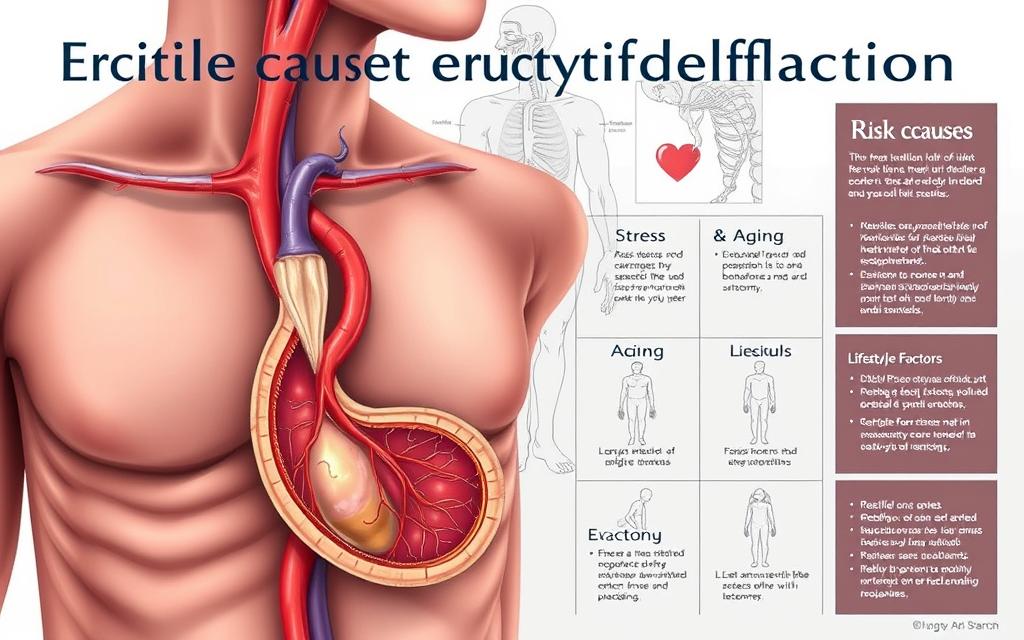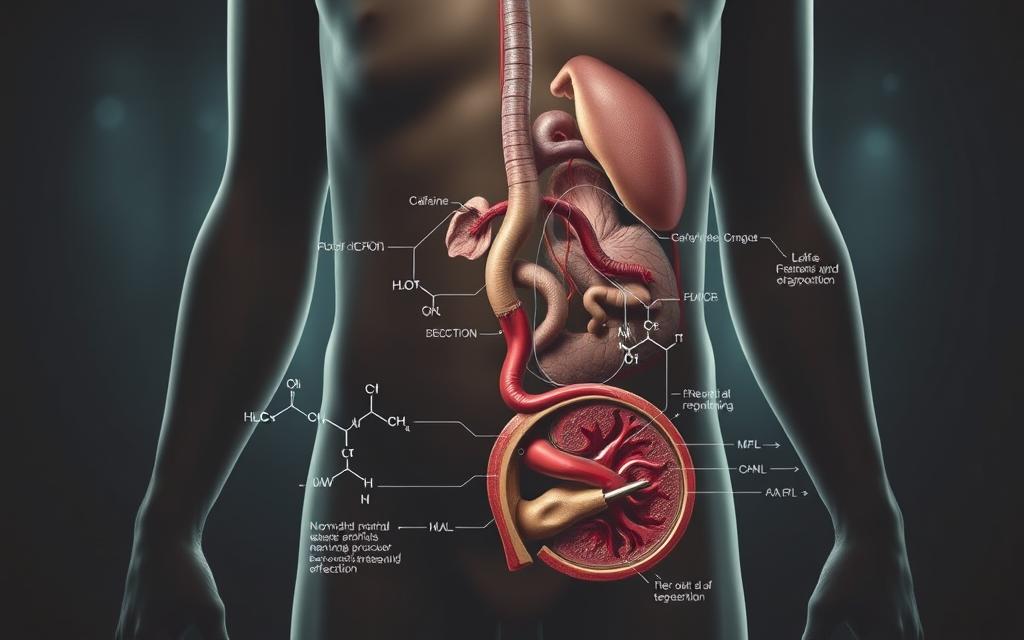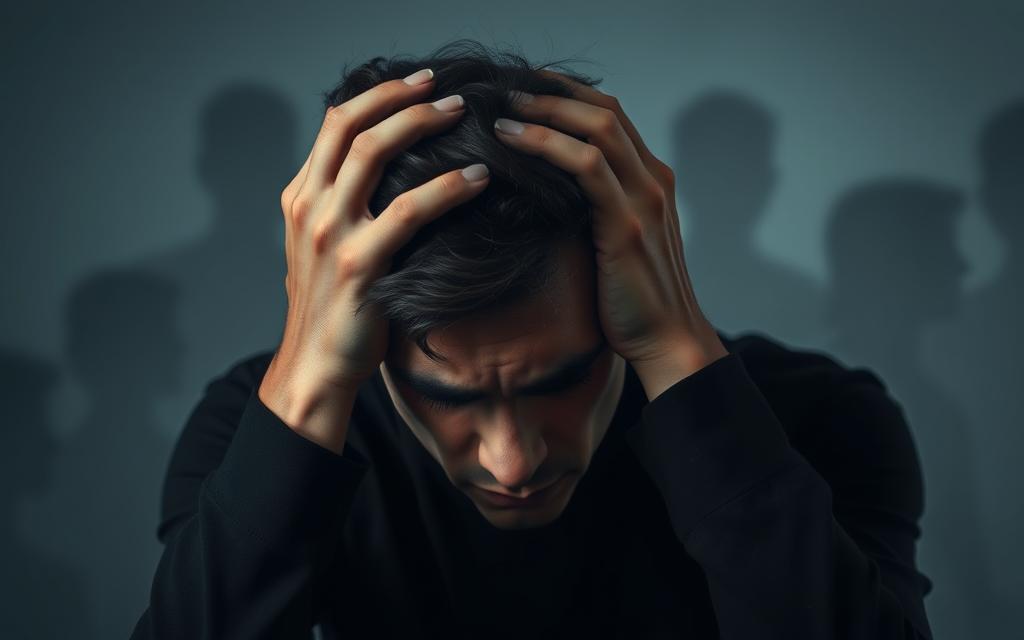Can Stress Cause Erectile Dysfunction? Understanding the Connection and Solutions
Stress is an inevitable part of modern life, and its impact on physical and mental health is well-documented. One area where stress can have a significant effect is on sexual health, particularly in the context of erectile dysfunction.
The relationship between stress and erectile dysfunction is complex. Stress can contribute to erectile issues by affecting the body’s physiological response to sexual stimulation. Understanding this connection is crucial for finding effective solutions.
By exploring the causes and the interplay between stress and sexual health, individuals can better navigate the challenges posed by erectile dysfunction. This article aims to shed light on the connection and potential paths to addressing it.
The Relationship Between Stress and Sexual Health
Chronic stress can have far-reaching consequences on both physical and mental health, particularly in the realm of sexual function. When the body experiences stress, it activates the hypothalamic-pituitary-adrenal (HPA) axis, leading to a cascade of physiological responses.
How Stress Affects Your Body’s Systems
Stress impacts various bodily systems, including the cardiovascular and endocrine systems. The release of stress hormones like cortisol and adrenaline can disrupt normal physiological processes, including those necessary for sexual function. For instance, chronic stress can lead to vascular constriction, reducing blood flow to the genitals.
The Psychological Impact of Stress on Sexual Function
The psychological effects of stress can be just as debilitating. Stress can lead to anxiety and depression, conditions known to negatively impact sexual desire and function. Furthermore, the mental burden of stress can cause performance anxiety, creating a vicious cycle that exacerbates sexual dysfunction.
Effective stress management techniques are crucial for mitigating these effects and improving overall sexual health. By addressing stress, individuals can take a significant step towards reclaiming their sexual well-being.
Understanding Erectile Dysfunction: Causes and Risk Factors
Understanding the root causes of erectile dysfunction is crucial for effective management and treatment. Erectile dysfunction (ED) is a condition that affects millions of men worldwide, impacting their quality of life and relationships. It’s a complex issue that can arise from a combination of physical, psychological, and lifestyle factors.
Physical Causes of ED
Physical causes of erectile dysfunction include conditions that affect the blood vessels, nerves, and hormones. Cardiovascular diseases, such as high blood pressure and atherosclerosis, can damage the blood vessels, restricting blood flow to the penis. Neurological disorders, including diabetes and multiple sclerosis, can also contribute to ED by damaging the nerves that control erection.
| Physical Condition | Impact on ED |
|---|---|
| Cardiovascular Disease | Damages blood vessels, reducing blood flow |
| Diabetes | Damages nerves and blood vessels |
| Obesity | Increases risk of cardiovascular disease and diabetes |
Psychological Factors Contributing to ED
Psychological factors play a significant role in erectile dysfunction. Stress, anxiety, and depression are common psychological contributors to ED. Performance anxiety can create a cycle where the fear of not being able to achieve an erection leads to further erectile difficulties. Addressing these psychological factors through counseling or therapy can be an effective way to manage ED.

The Stress-ED Connection: How Your Mind Affects Performance
The connection between stress and erectile dysfunction is multifaceted, involving both hormonal responses and psychological elements. When stress becomes a regular companion, it can significantly alter the body’s physiological state, impacting sexual health.
The Hormonal Response to Stress
Stress triggers the release of cortisol, a hormone that, when elevated over prolonged periods, can disrupt the body’s natural balance. This hormonal imbalance can affect testosterone levels, a crucial factor in sexual health. Lower testosterone levels can lead to decreased libido and erectile dysfunction. For more information on boosting testosterone, visit Colorado Urologists.
| Hormone | Role in Sexual Health | Effect of Stress |
|---|---|---|
| Cortisol | Regulates stress response | Elevated levels can disrupt hormonal balance |
| Testosterone | Crucial for libido and erectile function | Lowered levels due to chronic stress |
Performance Anxiety and Its Cyclical Effect
Performance anxiety can create a vicious cycle, where the fear of erectile dysfunction leads to increased stress, which in turn exacerbates the condition. This cycle can be challenging to break without addressing the underlying psychological factors. Mindfulness and relaxation techniques can help mitigate performance anxiety by reducing overall stress levels.
Understanding the interplay between stress, hormonal response, and performance anxiety is crucial for addressing erectile dysfunction effectively. By managing stress and adopting healthy lifestyle choices, individuals can improve their sexual health and overall well-being.
How Caffeine Worsens Erectile Dysfunction
Caffeine, a widely consumed stimulant, can have a significant impact on erectile dysfunction (ED). While it may provide a temporary energy boost, excessive caffeine consumption can exacerbate ED symptoms.
Caffeine’s Effect on Stress Hormones
Caffeine can influence stress hormones, particularly cortisol, which plays a crucial role in the body’s response to stress. Elevated cortisol levels can disrupt the body’s natural balance, potentially worsening ED.
The Science Behind Caffeine and Cortisol
When caffeine is consumed, it can cause a surge in cortisol production. This increase in cortisol can lead to a cascade of effects that ultimately impact erectile function.
Recommended Caffeine Limits for Men with ED
Men with ED should limit their daily caffeine intake to no more than 200-300 mg, approximately the amount found in 1-2 cups of brewed coffee. Exceeding this limit may exacerbate ED symptoms.
The Impact of Caffeine on Blood Flow and ED
Caffeine can also affect blood flow, a critical factor in achieving and maintaining an erection. While moderate caffeine consumption may not significantly impact blood flow, excessive intake can lead to vasoconstriction, reducing blood flow to the penis.
| Caffeine Intake | Effect on ED |
|---|---|
| Low (less than 200 mg/day) | Minimal impact |
| Moderate (200-300 mg/day) | Potential worsening of ED symptoms |
| High (more than 300 mg/day) | Likely to exacerbate ED symptoms |

Lifestyle Factors That Compound Stress-Related ED
Erectile dysfunction caused by stress can be further complicated by daily lifestyle habits. When managing stress-related erectile dysfunction, it’s essential to consider the role of lifestyle factors.
Sleep Deprivation and Its Connection to ED
Sleep deprivation is a significant lifestyle factor that can exacerbate erectile dysfunction. Lack of quality sleep can disrupt hormonal balances, particularly testosterone, which is crucial for sexual health. Research indicates that sleep disorders can increase the risk of developing erectile dysfunction.
Diet, Exercise, and Their Role in Sexual Health
Diet and exercise are fundamental components of a healthy lifestyle that can impact sexual function. A balanced diet rich in essential nutrients and regular physical activity can enhance overall well-being, including sexual health.
Foods That Help Combat Stress-Induced ED
Certain foods can help alleviate stress-induced erectile dysfunction. These include foods high in antioxidants, such as berries and leafy greens, and those rich in omega-3 fatty acids, like salmon. Incorporating these foods into your diet can support sexual health.
Exercise Routines That Improve Sexual Function
Regular exercise, particularly aerobic exercises like cycling and swimming, can improve sexual function by enhancing blood flow and reducing stress. Exercise routines that promote overall cardiovascular health are beneficial for combating erectile dysfunction.
| Lifestyle Factor | Impact on ED | Recommended Change |
|---|---|---|
| Sleep Deprivation | Increases risk of ED | Improve sleep quality |
| Poor Diet | Negatively affects sexual health | Eat a balanced diet |
| Lack of Exercise | Reduces blood flow and increases stress | Engage in regular physical activity |
Effective Stress Management Techniques for Improving Sexual Function
Effective stress management is key to overcoming sexual dysfunction caused by stress. Chronic stress can lead to a variety of sexual health issues, including erectile dysfunction. By adopting healthy stress management techniques, individuals can improve their sexual function and overall well-being.
Mindfulness and Meditation Practices
Mindfulness and meditation are powerful tools for managing stress. These practices help calm the mind, reduce anxiety, and improve emotional regulation. Regular mindfulness and meditation can lead to a decrease in stress hormones like cortisol, thereby improving sexual health. Techniques such as deep breathing, progressive muscle relaxation, and guided imagery can be particularly beneficial.
Mindfulness practices involve being present in the moment, which can help reduce performance anxiety and improve sexual experience. Meditation has been shown to enhance emotional intimacy and connection with one’s partner.
Physical Exercise as Stress Relief
Physical exercise is another effective way to manage stress and improve sexual function. Exercise reduces stress by releasing endorphins, also known as “feel-good” hormones. Regular physical activity can improve cardiovascular health, enhance mood, and increase energy levels, all of which are beneficial for sexual health.
Activities such as yoga and aerobic exercises are particularly effective. Yoga combines physical movement with mindfulness techniques, reducing stress and improving flexibility. Aerobic exercises, like running or cycling, improve cardiovascular health and boost overall energy.
By incorporating these stress management techniques into daily life, individuals can significantly improve their sexual function and overall quality of life.
Medical and Therapeutic Approaches to Stress-Induced ED
For men experiencing stress-related erectile dysfunction, various medical and therapeutic options are available to help restore sexual function. Stress-induced erectile dysfunction can significantly impact a man’s quality of life, but there are effective ways to manage and treat it.
When to Consult a Healthcare Provider
If you’re experiencing persistent erectile dysfunction, it’s crucial to consult a healthcare provider. They can help determine if your ED is related to stress or other underlying health issues. A healthcare provider can offer guidance on the best course of treatment and help you address any underlying conditions that may be contributing to your ED.
Key indicators that you should seek medical help include:
- Frequent or persistent difficulty achieving or maintaining an erection
- Presence of other health conditions, such as diabetes or heart disease
- Significant stress or anxiety related to sexual performance
Treatment Options and Their Effectiveness
Various treatment options are available for stress-induced erectile dysfunction, including:
- Oral medications, such as PDE5 inhibitors, which can help improve erectile function
- Counseling or therapy to address underlying psychological issues
- Lifestyle changes, such as improving diet, increasing exercise, and reducing stress
For more information on affordable erectile dysfunction treatment options, you can visit Colorado Urologists.
Couples Therapy and Communication Strategies
Couples therapy can be an effective way to address the emotional and relational aspects of stress-induced ED. By improving communication and understanding between partners, couples can work together to manage the condition. Strategies may include:
- Openly discussing feelings and concerns related to ED
- Engaging in intimacy-building activities that don’t focus solely on erections
- Practicing stress-reducing techniques together, such as meditation or yoga
By adopting a comprehensive approach that includes medical treatment, therapeutic support, and lifestyle changes, men can effectively manage stress-induced erectile dysfunction and improve their overall sexual health.
Conclusion: Reclaiming Your Sexual Health from Stress
Managing stress is crucial for maintaining optimal sexual health. By understanding the connection between stress and erectile dysfunction, individuals can take proactive steps to mitigate its effects. Incorporating stress management techniques, such as mindfulness, meditation, and physical exercise, can significantly improve overall well-being.
By adopting a balanced lifestyle, including a healthy diet and regular exercise, individuals can reduce the risk of erectile dysfunction. Effective stress management and a commitment to overall health can help individuals reclaim their sexual health and improve their quality of life.
Prioritizing sexual health through stress management techniques is essential for a fulfilling life. By making informed choices and seeking professional help when needed, individuals can overcome the challenges posed by stress and erectile dysfunction.
